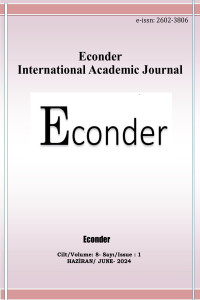Öz
Probabilistic decision making in scenario planning has long been a controversial topic in the global literature. After the scenarios are developed, how the decision-making process will take place and whether scenario possibilities can be included in the decision process is an important issue. There are two different views on the subject in the literature, and scenario studies are carried out in line with these two different views. While researchers who want to focus on a single future assign probabilities to scenarios, those who think that each of the alternative futures should be evaluated oppose probabilistic decision making. In this study, first of all, the thoughts of two opposing views are included, and then the differences between forecast and foresight and deductive and inductive reasoning are revealed. In the conclusion, the use of probability in scenarios was evaluated in terms of the distinction between forecast and foresight and the differences between deductive and inductive reasoning.
Anahtar Kelimeler
Scenario Planning Probability Forecast Foresight Reasoning Deduction Induction
Kaynakça
- Banuls, V. A. ve Salmeron, J. L., (2007). A scenario-based assessment model—SBAM. Technological Forecasting & Social Change, 74, 750–762. doi:10.1016/j.techfore.2006.05.015.
- Batak, K. (2008). Bilim türnevarım kaynaklı mıdır ya da türnevarım diye bir şey var mıdır?-Karl Popper'in türnevarım eleştirisi. Marmara Üniversitesi İlahiyat Fakültesi Dergisi, (34), 237-246.
- Bapoğlu, S., Açıkgöz, F., Kapısız, Ö., & Yılmaz, Ö. (2011). Hemşirelik öğrencilerinin eleştirel düşünme becerilerini geliştirmede drama yönteminin kullanılması. Düzce Üniversitesi Sağlık Bilimleri Enstitüsü Dergisi, 1(3), 17-21.
- Brauers, J., & Weber, M. (1988). A new method of scenario analysis for strategic planning. Journal of forecasting, 7(1), 31-47.
- Canyon, D. (2021). Simplifying complexity with strategic foresight and scenario planning. Security Nexus, 22. Coates, J. F., (2000). From my perspective: scenario planning. Technological Forecasting & Social Change, 65(1), 115-123.
- Cook, C. N., Inayatullah, S., Burgman, M. A., Sutherland, W. J., & Wintle, B. A. (2014). Strategic foresight: how planning for the unpredictable can improve environmental decision-making. Trends in ecology & evolution, 29(9), 531-541. http://dx.doi.org/10.1016/j.tree.2014.07.005
- Cuhls, K. (2003). From forecasting to foresight processes—new participative foresight activities in Germany. Journal of forecasting, 22(2‐3), 93-111. doi: 10.1002/for.848
- Dan-Suteu, S. A., & Giorgi, G. (2019). Future studies, forecast and foresight-critical considerations and relevant findings. eLearning & Software for Education, 1. doi: 10.12753/2066-026X-19-017
- De Kluyver, C. A. ve Moskowitz, H., (1984). Assessing scenario probabilities via interactive goal programming. Management Science, 30(3), 273-278.
- Derbyshire, J. (2017). Potential surprise theory as a theoretical foundation for scenario planning. Technological Forecasting and Social Change, 124, 77-87. http://dx.doi.org/10.1016/j.techfore.2016.05.008
- Divithure, H. ve Tang, C., (2018). Scenario-based strategy selection for a sustainable cadastral system development program – a case study of Sri Lanka. Survey Review, 50(361), 301-311. doi: 10.1080/00396265.2016.1268776
- Fohr, S. D. (1979). The deductive-inductive distinction. Informal Logic, 2(2).
- Gaspars-Wieloch, H. (2020). Critical analysis of classical scenario-based decision rules for pure strategy searching. Zeszyty Naukowe. Organizacja i Zarządzanie/Politechnika Śląska. doi: 10.3846/cibmee.2019.011
- Godet, M., & Roubelat, F. (1996). Creating the future: the use and misuse of scenarios. Long range planning, 29(2), 164-171.
- Goodwin, P., & Wright, G. (2001). Enhancing strategy evaluation in scenario planning: a role for decision analysis. Journal of management studies, 38(1), 1-16.
- Gordon, T. J. (1994). Trend impact analysis. Futures Research Methodology, Millennium Project.
- Grienitz, V., Hausicke, M. ve Schmidt, A., (2014). Scenario development without probabilities - focusing on the most important scenario. European Journal of Futures Research, 2(1), 1-13. doi 10.1007/s40309-013-0027-0
- Ha-Duong, M. (2006). Scenarios, probability and possible futures. Erişim adresi: http://halshs.archives-ouvertes.fr/halshs-00003925/en/.
- Karvetski, C. W. ve Lambert, J. H., (2012). Evaluating deep uncertainties in strategic priority-setting with an application to facility energy investments. Systems Engineering, 15(4), 483-493. doi 10.1002/sys.21215
- Kirkwood, C. W. ve Pollock, S. M., (1982). Multiple attribute scenarios, bounded probabilities, and threats of nuclear theft”, Futures, 14(6), 545-553.
- Mietzner, D., & Reger, G. (2005). Advantages and disadvantages of scenario approaches for strategic foresight. International Journal of Technology Intelligence and Planning, 1(2), 220-239.
- Millett, S. M., (2009). Should probabilities be used with scenarios?. Journal of Futures Studies, 13(4), 61-68. Mobasheri, F., Orren, L. H. ve Sionshansi, F. P., (1989). Scenario planning at Southern California Edison”, Interfaces, 19(5), 31-44.
- Nance, D. A. (2017). Formalism and potential surprise: theorizing about standards of proof. Seton Hall L. Rev., 48, 1017.
- Ormerod, R. J. (2010). Rational inference: Deductive, inductive and probabilistic thinking. Journal of the Operational Research Society, 61, 1207-1223. doi:10.1057/jors.2009.96
- Ramirez, R. ve Selin, C., (2014). Plausibility and probability in scenario planning. Foresight, 16(1), 54-74. doi 10.1108/FS-08-2012-0061
- Rothchild, I. (2006). Induction, deduction, and the scientific method. In Society for the Study of Reproduction (pp. 1-11).
- Schoemaker, P. J. (1995). Scenario planning: a tool for strategic thinking. Sloan Management Review, 36(2), 25-50.
- Tiberius, V., (2019). Scenarios in the strategy process: A framework of affordances and constraints, European Journal of Futures Research, 7(7), 1-14. https://doi.org/10.1186/s40309-019-0160-5
- Tsoukas, H., & Shepherd, J. (2004). Introduction: Organizations and the future: from forecast to foresight. In H. Tsoukas & J. Shepherd (Eds.), Managing the future: Foresight in the knowledge economy. London: Blackwell.
- Vacik, E., Fotr, J., Spacek, M. ve Soucek, I., (2014). Scenarios and their application in strategic planning. Ekonomika A Management, XVII(3), 118-135.
- Van Der Heijden, K., (1997). Scenarios, strategy and the strategy process. Global Business Network Presearch, Provoking Strategic Conversation, 1(1), 1-32.
- Van Der Merwe, L., (2008). Scenario-based strategy in practice: a framework. Advances in Developing Human Resources, 10(2), 216-239. doi: 10.1177/1523422307313321
- Varum, C. A. ve Melo, C., (2010). Directions in scenario planning literature – a review of the past decades. Futures, 42, 355–369.
- Yu, C. H. (1994). Abduction? Deduction? Induction? Is There a Logic of Exploratory Data Analysis?. Paper Presented at the Annual Meeting of American Educational Research Association, New Orleans, LO. Erişim adresi: https://eric.ed.gov/?id=ED376173.
Öz
Senaryo planlamada olasılıksal karar verme, evrensel literatürde uzun süredir tartışmaya açık bir konu olmuştur. Senaryolar geliştirildikten sonra karar verme aşamasının nasıl gerçekleşeceği ve senaryo olasılıklarının karar süreçlerine dahil edilip edilemeyeceği önemli bir konu olarak karşımıza çıkmaktadır. Literatürde konu ile ilgili iki farklı görüş mevcuttur ve senaryo çalışmaları bu iki farklı görüş doğrultusunda gerçekleşmektedir. Tek bir geleceğe odaklanmak isteyen araştırmacılar senaryolara olasılık ataması gerçekleştirirken, alternatif geleceklerin her birinin değerlendirmeye alınması gerektiğini düşünenler ise olasılıksal karar vermeye karşı çıkmaktadır. Bu çalışmada, öncelikle iki karşıt görüşün düşüncelerine yer verilmiş, daha sonra tahmin ve öngörü ile tümdengelimli ve tümevarımsal akıl yürütmenin farkları ortaya konulmuştur. Sonuç kısmında ise senaryolarda olasılık kullanımı, tahmin ve öngörü ayrımı ile tümdengelimli ve tümevarımsal akıl yürütmenin farkları açısından değerlendirilmiştir.
Anahtar Kelimeler
senaryo planlama olasılık tahmin öngörü akıl yürütme tümdengelim tümevarım
Kaynakça
- Banuls, V. A. ve Salmeron, J. L., (2007). A scenario-based assessment model—SBAM. Technological Forecasting & Social Change, 74, 750–762. doi:10.1016/j.techfore.2006.05.015.
- Batak, K. (2008). Bilim türnevarım kaynaklı mıdır ya da türnevarım diye bir şey var mıdır?-Karl Popper'in türnevarım eleştirisi. Marmara Üniversitesi İlahiyat Fakültesi Dergisi, (34), 237-246.
- Bapoğlu, S., Açıkgöz, F., Kapısız, Ö., & Yılmaz, Ö. (2011). Hemşirelik öğrencilerinin eleştirel düşünme becerilerini geliştirmede drama yönteminin kullanılması. Düzce Üniversitesi Sağlık Bilimleri Enstitüsü Dergisi, 1(3), 17-21.
- Brauers, J., & Weber, M. (1988). A new method of scenario analysis for strategic planning. Journal of forecasting, 7(1), 31-47.
- Canyon, D. (2021). Simplifying complexity with strategic foresight and scenario planning. Security Nexus, 22. Coates, J. F., (2000). From my perspective: scenario planning. Technological Forecasting & Social Change, 65(1), 115-123.
- Cook, C. N., Inayatullah, S., Burgman, M. A., Sutherland, W. J., & Wintle, B. A. (2014). Strategic foresight: how planning for the unpredictable can improve environmental decision-making. Trends in ecology & evolution, 29(9), 531-541. http://dx.doi.org/10.1016/j.tree.2014.07.005
- Cuhls, K. (2003). From forecasting to foresight processes—new participative foresight activities in Germany. Journal of forecasting, 22(2‐3), 93-111. doi: 10.1002/for.848
- Dan-Suteu, S. A., & Giorgi, G. (2019). Future studies, forecast and foresight-critical considerations and relevant findings. eLearning & Software for Education, 1. doi: 10.12753/2066-026X-19-017
- De Kluyver, C. A. ve Moskowitz, H., (1984). Assessing scenario probabilities via interactive goal programming. Management Science, 30(3), 273-278.
- Derbyshire, J. (2017). Potential surprise theory as a theoretical foundation for scenario planning. Technological Forecasting and Social Change, 124, 77-87. http://dx.doi.org/10.1016/j.techfore.2016.05.008
- Divithure, H. ve Tang, C., (2018). Scenario-based strategy selection for a sustainable cadastral system development program – a case study of Sri Lanka. Survey Review, 50(361), 301-311. doi: 10.1080/00396265.2016.1268776
- Fohr, S. D. (1979). The deductive-inductive distinction. Informal Logic, 2(2).
- Gaspars-Wieloch, H. (2020). Critical analysis of classical scenario-based decision rules for pure strategy searching. Zeszyty Naukowe. Organizacja i Zarządzanie/Politechnika Śląska. doi: 10.3846/cibmee.2019.011
- Godet, M., & Roubelat, F. (1996). Creating the future: the use and misuse of scenarios. Long range planning, 29(2), 164-171.
- Goodwin, P., & Wright, G. (2001). Enhancing strategy evaluation in scenario planning: a role for decision analysis. Journal of management studies, 38(1), 1-16.
- Gordon, T. J. (1994). Trend impact analysis. Futures Research Methodology, Millennium Project.
- Grienitz, V., Hausicke, M. ve Schmidt, A., (2014). Scenario development without probabilities - focusing on the most important scenario. European Journal of Futures Research, 2(1), 1-13. doi 10.1007/s40309-013-0027-0
- Ha-Duong, M. (2006). Scenarios, probability and possible futures. Erişim adresi: http://halshs.archives-ouvertes.fr/halshs-00003925/en/.
- Karvetski, C. W. ve Lambert, J. H., (2012). Evaluating deep uncertainties in strategic priority-setting with an application to facility energy investments. Systems Engineering, 15(4), 483-493. doi 10.1002/sys.21215
- Kirkwood, C. W. ve Pollock, S. M., (1982). Multiple attribute scenarios, bounded probabilities, and threats of nuclear theft”, Futures, 14(6), 545-553.
- Mietzner, D., & Reger, G. (2005). Advantages and disadvantages of scenario approaches for strategic foresight. International Journal of Technology Intelligence and Planning, 1(2), 220-239.
- Millett, S. M., (2009). Should probabilities be used with scenarios?. Journal of Futures Studies, 13(4), 61-68. Mobasheri, F., Orren, L. H. ve Sionshansi, F. P., (1989). Scenario planning at Southern California Edison”, Interfaces, 19(5), 31-44.
- Nance, D. A. (2017). Formalism and potential surprise: theorizing about standards of proof. Seton Hall L. Rev., 48, 1017.
- Ormerod, R. J. (2010). Rational inference: Deductive, inductive and probabilistic thinking. Journal of the Operational Research Society, 61, 1207-1223. doi:10.1057/jors.2009.96
- Ramirez, R. ve Selin, C., (2014). Plausibility and probability in scenario planning. Foresight, 16(1), 54-74. doi 10.1108/FS-08-2012-0061
- Rothchild, I. (2006). Induction, deduction, and the scientific method. In Society for the Study of Reproduction (pp. 1-11).
- Schoemaker, P. J. (1995). Scenario planning: a tool for strategic thinking. Sloan Management Review, 36(2), 25-50.
- Tiberius, V., (2019). Scenarios in the strategy process: A framework of affordances and constraints, European Journal of Futures Research, 7(7), 1-14. https://doi.org/10.1186/s40309-019-0160-5
- Tsoukas, H., & Shepherd, J. (2004). Introduction: Organizations and the future: from forecast to foresight. In H. Tsoukas & J. Shepherd (Eds.), Managing the future: Foresight in the knowledge economy. London: Blackwell.
- Vacik, E., Fotr, J., Spacek, M. ve Soucek, I., (2014). Scenarios and their application in strategic planning. Ekonomika A Management, XVII(3), 118-135.
- Van Der Heijden, K., (1997). Scenarios, strategy and the strategy process. Global Business Network Presearch, Provoking Strategic Conversation, 1(1), 1-32.
- Van Der Merwe, L., (2008). Scenario-based strategy in practice: a framework. Advances in Developing Human Resources, 10(2), 216-239. doi: 10.1177/1523422307313321
- Varum, C. A. ve Melo, C., (2010). Directions in scenario planning literature – a review of the past decades. Futures, 42, 355–369.
- Yu, C. H. (1994). Abduction? Deduction? Induction? Is There a Logic of Exploratory Data Analysis?. Paper Presented at the Annual Meeting of American Educational Research Association, New Orleans, LO. Erişim adresi: https://eric.ed.gov/?id=ED376173.
Ayrıntılar
| Birincil Dil | Türkçe |
|---|---|
| Konular | İşletme |
| Bölüm | Makaleler |
| Yazarlar | |
| Yayımlanma Tarihi | 30 Haziran 2024 |
| Yayımlandığı Sayı | Yıl 2024 Cilt: 8 Sayı: 1 |
"Econder International Academic Journal" Ekonomi ve İşletmenin tüm yönleriyle ilgili bilimsel makaleler yayınlamaya adanmış uluslararası hakemli bir multidisipliner dergidir. Yılda iki kez çevrimiçi olarak sunulan ve yayınlanan dergide, Ekonomi ve İşletmenin tüm alanlarındaki yeni bulgular ve tartışmalar için dünyanın önde gelen platformlarından biri olmayı hedefliyoruz.





